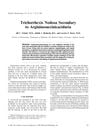 29 citations,
February 2017 in “International Journal of Women's Dermatology”
29 citations,
February 2017 in “International Journal of Women's Dermatology” Women with excessive male-pattern hair growth should get a full hormone check-up to find and treat any underlying issues, considering both medical and emotional aspects.
 27 citations,
January 2009 in “Journal of The European Academy of Dermatology and Venereology”
27 citations,
January 2009 in “Journal of The European Academy of Dermatology and Venereology” Men with a certain type of hair loss (AGA) have higher bad cholesterol and lower good cholesterol levels, making them more likely to get heart disease.
 20 citations,
May 2016 in “Journal of Cosmetic Dermatology”
20 citations,
May 2016 in “Journal of Cosmetic Dermatology” Low vitamin D receptor levels found in hair loss patients; topical vitamin D treatment suggested.
 13 citations,
June 1989 in “Pediatric clinics of North America/The Pediatric clinics of North America”
13 citations,
June 1989 in “Pediatric clinics of North America/The Pediatric clinics of North America” The conclusion is that young women with excessive hair growth should be quickly tested for hormonal issues and treated to improve their social well-being.
 6 citations,
October 2018 in “Endocrinology”
6 citations,
October 2018 in “Endocrinology” Prenatally androgenized ewes can model increased hair diameter in women with PCOS.
 5 citations,
May 2020 in “Diagnostics”
5 citations,
May 2020 in “Diagnostics” Lower zinc levels may predict less effective hair loss treatment.
 4 citations,
February 1995 in “Journal of Clinical Dermatology”
4 citations,
February 1995 in “Journal of Clinical Dermatology” More men than women have hair loss, it's often inherited, and it's linked with higher testosterone levels. There's been a rise in female hair loss patients.
1 citations,
January 2020 in “International Journal of Trichology” High YKL-40 levels predict early hair loss and hidden metabolic issues.
 September 2024 in “Journal of the American Academy of Dermatology”
September 2024 in “Journal of the American Academy of Dermatology” Iron infusions can help improve hair loss in patients who can't take oral iron supplements.
 September 2023 in “Journal of Education, Health and Sport”
September 2023 in “Journal of Education, Health and Sport” PRP shows promise for skin and hair treatments but needs more research to confirm its effectiveness.
Higher alarin levels might link hair loss and metabolic syndrome.
July 2018 in “Benha Journal of Applied Sciences” Higher homocysteine levels may predict hair loss severity.
January 2017 in “Indian journal of health sciences and biomedical research KLEU” There is no link between hair loss and prostate enlargement.
 36 citations,
June 2014 in “PLOS ONE”
36 citations,
June 2014 in “PLOS ONE” Finasteride, a hair loss drug, may cause long-term sexual side effects due to changes in hormone receptor levels.
 27 citations,
March 2012 in “Dermatologic Therapy”
27 citations,
March 2012 in “Dermatologic Therapy” Taking zinc supplements can help improve or cure hair loss caused by zinc deficiency.
 11 citations,
January 2011 in “Turkish Journal of Medical Sciences”
11 citations,
January 2011 in “Turkish Journal of Medical Sciences” Low iron levels are a significant risk factor for hair loss, while high vitamin D levels might be a response to hair loss, not a cause.
5 citations,
August 1981 in “Archives of Dermatology” Alopecia areata may be caused by the immune system attacking hair follicles.
 2 citations,
March 2017 in “Canadian Urological Association journal”
2 citations,
March 2017 in “Canadian Urological Association journal” Clomiphene citrate improves fertility in men taking finasteride for hair loss.
 1 citations,
March 2020 in “QJM: An International Journal of Medicine”
1 citations,
March 2020 in “QJM: An International Journal of Medicine” Lactoferrin levels are lower in people with chronic hair shedding, suggesting supplements could help treat it.
 April 2022 in “Research Square (Research Square)”
April 2022 in “Research Square (Research Square)” Iron deficiency is linked to a common type of hair loss called telogen effluvium.
 February 2022 in “Cosmetic Dermatology”
February 2022 in “Cosmetic Dermatology” Platelet Rich Plasma (PRP) is increasingly used in cosmetic dermatology for hair loss, facial rejuvenation, and after cosmetic procedures, and can be stored for up to 90 days for daily home use.
 25 citations,
September 2019 in “PubMed”
25 citations,
September 2019 in “PubMed” Platelet-Rich Plasma (PRP) is helpful for skin and hair treatments and works better when combined with other procedures.
 7 citations,
February 2022 in “Journal of Cosmetic Dermatology”
7 citations,
February 2022 in “Journal of Cosmetic Dermatology” Injecting vitamin D3 into the skin is an effective treatment for patchy hair loss.
7 citations,
August 1985 in “British journal of dermatology/British journal of dermatology, Supplement” Medroxyprogesterone acetate injections are more effective than topical ointment in treating excessive hair growth in women.
 1 citations,
March 2020 in “International journal of reproduction, contraception, obstetrics and gynecology”
1 citations,
March 2020 in “International journal of reproduction, contraception, obstetrics and gynecology” The study concluded that the most common skin problems in women with PCOS are excess hair, acne, oily skin, hair loss, dark skin patches, and skin tags.
 April 2024 in “Benha Medical Journal”
April 2024 in “Benha Medical Journal” H. pylori infection may be linked to the hair shedding condition Telogen Effluvium.
 November 2022 in “The Journal of Clinical Endocrinology and Metabolism”
November 2022 in “The Journal of Clinical Endocrinology and Metabolism” Postmenopausal hyperandrogenism, a condition with symptoms like increased hair growth and acne, is usually caused by PCOS but can also be due to other factors. It's diagnosed by checking testosterone levels and treated either by removing the adrenal tumor or through antiandrogen therapy.
 September 2010 in “European Urology Supplements”
September 2010 in “European Urology Supplements” Higher urethral PSA levels after prostate removal surgery may be linked to more hair loss and higher PSA levels post-surgery.
 40 citations,
April 2014 in “Genes & Development”
40 citations,
April 2014 in “Genes & Development” Hormones during pregnancy and lactation keep skin stem cells inactive, preventing hair growth.
 33 citations,
January 2007 in “Pediatric dermatology”
33 citations,
January 2007 in “Pediatric dermatology” Hair thinning and loss in a girl with a rare metabolic disorder was linked to her condition.
























